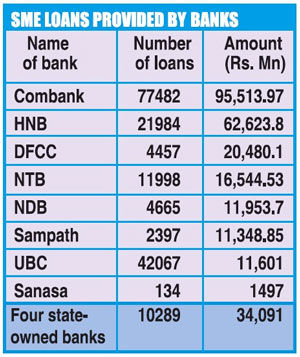14 Jun 2013 - {{hitsCtrl.values.hits}}
 Sri Lanka’s private commercial banks have significantly surpassed state-owned banks in funding Small and Medium Enterprises (SMEs) in 2012, a stark contrast to the situation in 2011, the latest annual report of the Ministry of Finance and Planning showed.
Sri Lanka’s private commercial banks have significantly surpassed state-owned banks in funding Small and Medium Enterprises (SMEs) in 2012, a stark contrast to the situation in 2011, the latest annual report of the Ministry of Finance and Planning showed. Commercial Bank PLC has been the single largest lender to SMEs during 2012 with Rs.95.5 billion worth of loans, followed by Hatton National Bank PLC with Rs.62.6 billion worth of loans.
Commercial Bank PLC has been the single largest lender to SMEs during 2012 with Rs.95.5 billion worth of loans, followed by Hatton National Bank PLC with Rs.62.6 billion worth of loans.
27 Dec 2024 9 hours ago
27 Dec 2024 9 hours ago
27 Dec 2024 27 Dec 2024
27 Dec 2024 27 Dec 2024
27 Dec 2024 27 Dec 2024